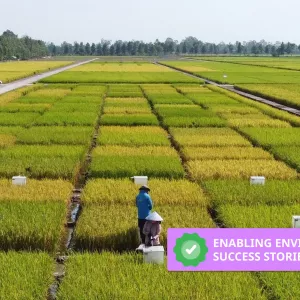Creating the Conditions for Change: How Partnerships are Transforming Rice Production
Public-private partnerships (PPPs) are a powerful tool for transforming agriculture, and nowhere is this more evident than in the global effort to create a sustainable, low-emission rice sector. While low-emission rice is physically identical to its traditional counterpart, the enabling environment—the policies, market incentives, and collaborations that support its production—is what truly sets it apart. The International Rice Research Institute

Creating the Conditions for Change: How Partnerships are Transforming Rice Production
Public-private partnerships (PPPs) are a powerful tool for transforming agriculture, and nowhere is this more evident than in the global effort to create a sustainable, low-emission rice sector. While low-emission rice is physically identical to its traditional counterpart, the enabling environment—the policies, market incentives, and collaborations that support its production—is what truly sets it apart. The International Rice Research Institute (IRRI) has become a trusted partner in this transformation, using its scientific expertise to help create the conditions for a global shift toward sustainable rice.

Laying the groundwork for change: Three key collaborations
IRRI’s role in developing the enabling environment for low-emission rice is best understood through its involvement in three key PPPs. These collaborations show how strategic engagement can translate scientific research into real-world impact, often without the direct measure of publications or project funding.
1. The Partnership for Sustainable Agriculture in Viet Nam (PSAV) and Grow Asia
PSAV, together with its parent organization, Grow Asia, is a key public-private collaboration. As the technical working group for Vietnam’s One Million Hectare Program for low-emission rice, its Rice Task Force tackles challenges from farming practices to finance. IRRI, a trusted partner, provides crucial technical guidance. Instead of just research, IRRI scientists directly advise government and industry on technology, certification, and market linkages. This strategic role ensures IRRI’s independent, scientific expertise shapes national policy and influences key programs, fostering a thriving, sustainable rice sector.

2. The Sustainable Rice Landscapes Initiative (SRLI)
SRLI is a global platform that unites public and private partners to scale sustainable rice production. As a founding member, IRRI provides the scientific backbone for the initiative’s work in policy, finance, and technology. A key effort is the Blended Finance Facility, which uses a grant to de-risk private investments for sustainable projects. This is paving the way for a global rice fund over USD 500M. IRRI’s role ensures that these financial programs are grounded in scientific evidence, guaranteeing real-world methane reductions and other benefits.

3. The World Economic Forum’s First Movers Coalition for Food (FMC4F)
FMC4F is an industry-led group of major buyers creating a “market pull” for sustainable rice. These companies commit to sourcing low-emission products, incentivizing farmers to adopt climate-smart practices. As a founding partner, IRRI provides the science that underpins this effort. IRRI’s role is to develop the high-integrity standards and Measurement, Reporting, and Verification (MRV) tools that define “sustainable” rice, ensuring procurement commitments are transparent and credible. This participation links global demand with local support, de-risking the transition for farmers.

Catalyzing a global shift
Through these strategic collaborations, IRRI’s work goes beyond the traditional metrics of research. The organization’s catalytic value lies in its ability to influence policy, shape market dynamics, and build trust among diverse stakeholders. By providing a seat at the table where high-level decisions are made, these PPPs ensure that the transition to low-emission rice is not only scientifically sound but also economically viable and widely supported.
Looking forward, IRRI will continue to leverage these networks to enhance its research, ensuring that it remains relevant and responsive to the evolving needs of the sector. The ultimate goal is to create a thriving ecosystem where sustainable rice landscapes are the norm, not the exception, supporting farmers, feeding a growing population, and protecting our planet.

Read the full Enabling Environment Success Story:
Compiled by the CGIAR Scaling for Impact (S4I) program, the “Enabling Environment Success and Failure Stories” is a collection of accounts that chronicles both the successful and unsuccessful efforts in creating a supportive environment for scaling agrifood system innovations. Through compelling narratives that highlight specific challenges, key players, and outcomes, this series is designed to demonstrate how CGIAR actively influences and strengthens these environments to achieve a wider, more impactful reach.


